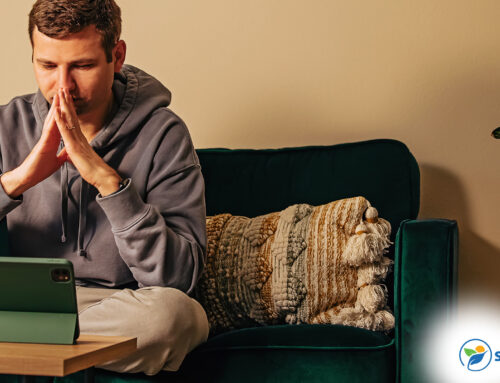Sleeping aids can help people with insomnia and other sleep disorders get a good night’s rest, but using some types such as benzodiazepines can be habit-forming and lead to addiction. People can also abuse these drugs by taking them recreationally. If you’re concerned that someone you love might be abusing these prescription medications, being able to spot the warning signs and knowing how to get off of sleeping pills safely may help you take action.
The Dangers of Sleeping Aid Abuse
Sleeping aid abuse can lead to physical and mental dependence on the drug. Once a person becomes dependent, they can experience symptoms such as anxiety, insomnia, sweating, nausea and mood swings when the drug isn’t in their system. They may start seeking out sleep aids again to avoid feeling these unpleasant symptoms.
Over time, a person may need to take sleep aids more often to get the desired effects or stave off withdrawal. And contrary to popular belief, it’s possible to overdose on benzodiazepines such as Xanax. In fact, benzodiazepines played a role in about 16% of all opioid overdose deaths in 2020 alone. When someone increases their dosage of a benzodiazepine, they’re also more likely to overdose.
Other sleep aids can lead to adverse events and overdose too. The use of zolpidem (Ambien) has been identified as one of the leading causes of emergency room visits due to psychotic drug reactions.
Spotting the Symptoms of Sleeping Pill Abuse
The first step in helping someone who’s abusing sleeping pills is to recognize that there’s a problem. The signs a person may be abusing benzodiazepines or other sleep aids include:
- Daytime drowsiness
- Memory problems
- Slurred speech
- Nervousness or restlessness
- Hostility and irritability
- Problems focusing
- Lack of coordination
- Snorting sleeping aids rather than taking them by mouth
- Sleeping more or being difficult to rouse from sleep
- Frequent nightmares or vivid dreams
- Finding crushed powders or tools used for crushing
- Being in possession of rolled paper currency, drinking straws and other objects that could be used for snorting
- Poor performance at work or school
- Secretive behaviors
A person may not show all these warning signs of sleeping aid abuse. However, if they’re displaying more than one or two of the symptoms on the above list, they may be misusing sleeping aids.
How to Help Someone Who’s Abusing Sleeping Pills
If you see signs that someone you love is abusing sleep aids, don’t ignore the problem. Although sleeping aids are prescription medications, they can cause negative physical and mental health effects and pose a risk of overdose when misused. Follow these tips to help your loved one.
Don’t Insist They Stop Taking the Medication Suddenly
When someone is abusing sleeping pills, you might think the best course of action is to just stop taking them, but doing so can be dangerous. Because sleeping aids can have severe withdrawal symptoms, a person who’s misusing them should never stop abruptly. Instead, advise them to see a health care professional who can explain how to get off Ambien or another sleeping pill safely.
Express Your Concerns Without Passing Judgment
Shame can lead to an increase in substance use. When you talk to your loved one about their sleeping pill use, avoid passing judgement. Understanding that addiction is a disease can help. After all, you wouldn’t blame or shame someone for developing cancer or other serious health condition.
Instead, focus on sharing your concerns. Point out the behaviors that led you to address the problem and state why you’re worried. Assure your loved one that you’re not trying to attack them and you care about them deeply. Express your willingness to be there for them and provide ongoing support.
Time Conversations Right
Understanding when to talk to your loved one about sleeping pill misuse is as important as knowing what to say. Don’t try to have a conversation when the person is under the influence of a sleeping aid, as they may not be able to focus on what you’re saying.
Also, avoid discussing the matter when there’s already tension between you. Bringing up substance abuse in the middle of a heated argument is unlikely to be productive.
Be Prepared for Denial
Often, people who misuse drugs are reluctant to admit they have a problem. They may not see the situation clearly for what it is or feel too much shame to accept responsibility. As a result, your loved one may become angry or defensive when you bring up the topic.
Be ready for them to deny they’re abusing sleeping aids. They may be willing to say they’re taking the drug but insist it’s not an issue, or they might claim they’re not taking it at all. If this happens, calmly restate what you’ve witnessed.
If you find your loved one isn’t ready to confront the problem, don’t give up. When the time is right, continue to share your thoughts and concerns.
Encourage Them to Seek Treatment
Inpatient and outpatient drug rehab can help a person break free of the cycle of sleeping aid misuse and reduce the risk of future abuse. Encouraging your loved one to enter a treatment program is the best way you can help.
Research the available treatment options ahead of time so you can explain them to your loved one. Offer to help them contact a treatment provider. If inpatient rehab is the right option for their situation, you could also help them make arrangements to take time off work or school, find someone to care for children or pets and handle other practical matters.
Most importantly, let your loved one know you’ll be there to listen and help during their treatment and beyond.
How to Get Off of Sleeping Pills With Help
If you believe a loved one is abusing sleep aids, getting treatment for addiction can help them start on a path to a better life. Our trained medical and mental health professionals at Sunlight Recovery know how to wean off of sleeping pills and can provide the monitoring needed to help them stop safely. Contact us today to learn more about our treatment programs for sleeping aid abuse.






